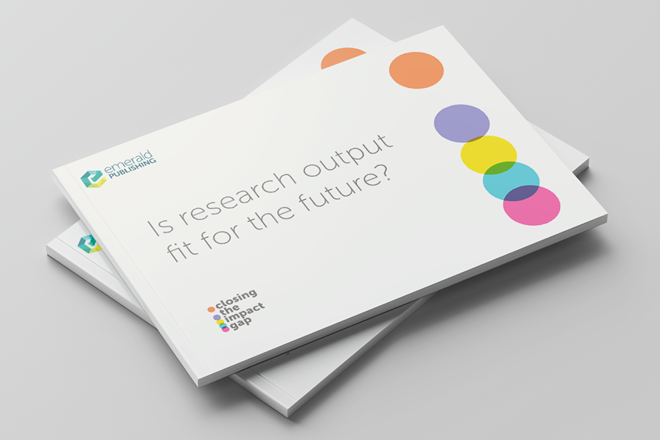We know that part of the journey to real-world impact relies on making research both accessible and engaging for policy makers, communities, and end-users. But do current research formats effectively communicate to these groups?
The research paper dominates academic communication and has changed little in more than 350 years, but should it be reimagined? If research is to have a real-world impact, shouldn’t it be communicated in more user-friendly formats?
With such a variety of communication and dissemination options, for how long will traditional academic outputs remain the primary way to communicate research? Will the students of today and the rising stars of tomorrow be the ones to revolutionise the way academic research is presented, or will the structures and incentives that currently dictate the research ecosystem, hinder future academics from doing things differently?

Is research output fit for the future?
Advances in the digital space make it easier for researchers to collaborate and share findings. However, despite these opportunities, published research is often inaccessible or difficult to use in practice. Our commitment to help researchers drive change in society, along with supporting quality education for all, has prompted us to seek answers to questions on how research is currently used and shared both within and outside of academia and how research outputs might be developed in the future to advance accessibility, learning, and drive positive societal change.
To gain insight on these issues, we gathered the views of students, early career researchers and the established academic research community from across the globe.

Roadmap to impact
At Emerald, we have made a commitment to drive research impact, and while we are proud of the progress we’ve made and the difference it makes, there is still important work to be done.
Our roadmap shares the story of how far we have travelled on this journey, and our intentions to support change in the future.
Is research output fit for the future?
For research to drive change, it needs to be accessible and engaging for those both inside and outside of academia. But do current research formats effectively do this, or is it time for a change?
What are the challenges that could stand in the way of change, and where does the responsibility sit to ensure change can happen?
Guest panel & host
Guest panel
- Louis Coiffatt - Senior Policy Advisor, Open Innovation Team, HM Government
- Dr Crystal Abidin – Associate Professor of Internet Studies, Curtin University, Australia
- Dr Rillie Raaper - Associate Professor and Deputy Direct of Research, School of Education, Durham University, UK
Panel host
- Juliet Harrison – Cases Lead at Emerald Publishing
Achieving impact in education research
This joint webinar – chaired by Dominic Wyse, President of BERA and Professor of Early Childhood and Primary Education at UCL, heard from:
- Professor Natalia Kucirkova, Professor of Early Childhood Education and Development at the University of Stavanger, Norway and Professor of Reading and Children’s Development at The Open University, UK
- Dr Helen Beddow, Emerald’s Content Manager for impact services working on new resources to help immerse researchers and staff within the research office into impact culture
- Professor Tom Crick, Professor of Digital Education & Policy at Swansea University.
Publish with us
Choose the right home for your research across our journals, books, teaching cases and open access options. Follow our guides and find the right resources to help you submit, publish and promote your work.

Our goal for quality education for all
We believe in quality education for everyone, everywhere and by highlighting the issue and working with experts in the field, we can start to find ways we can all be part of the solution.
Our goal is to help researchers to share their work, and partner to find ways to break down the divides so there is equal opportunity to access quality education and participate in higher education, training and work, with a voice that is heard. We believe everyone should have a chance to be the best they can be regardless of where they started.

Emerald Cases Hub
The Emerald Cases Hub is a free resource, designed to support the writing of, preparing for, and teaching of case studies.
Created and delivered by experts in business education, the materials in the Hub cover a range of topics, from advice for getting published to strategies for engaging students in the classroom.



